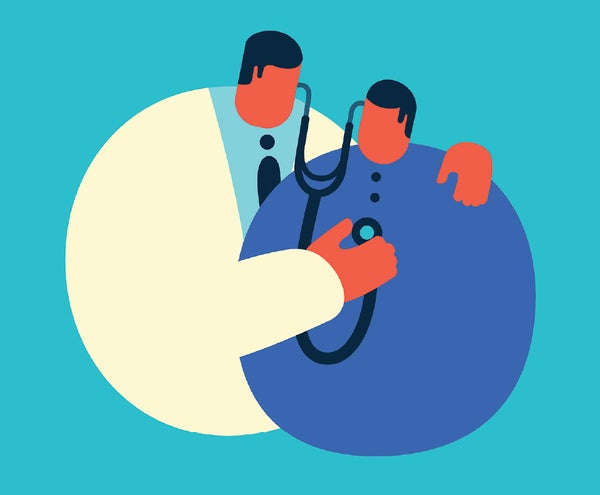I just turned 40, and no matter how well I take care of myself, I'm going to be seeing doctors more often as I continue to age. First, there are the sundry screenings one starts to require in middle age, mammograms and colonoscopies and the like. Plus, the risk of common ills such as hypertension and high cholesterol (both of which run in my family) starts to inch up. But being a good patient can be hard, as I found out last year during an extended but—I realize now—fully preventable dental ordeal. Here's what health and psychology studies have to say about becoming better partners in our own health.
#1 Ask a ton of questions. Arguably one of the best ways to be a good patient is by following your prescribed treatment or prevention plan. It's a concept known as compliance in medical research, but psychologist Richard M. Ryan doesn't like the passive sound of that term. “If you understand the rationale behind a doctor's recommendation, then you're more likely to embrace it and autonomously engage in a treatment,” says Ryan, one of the founders of self-determination theory, which posits that internal sources of motivation are stronger than external rewards or threats. Ryan and his colleagues at the University of Rochester have found that people who ask the most questions about a recommended treatment are also the ones most likely to follow it—and achieve the best health outcomes. “Practitioners are pressed for time, and the medical system often doesn't actively encourage people to express their concerns, but you need to participate as a full partner in your treatment,” Ryan says. If your doctor is not supportive of that, it's time to find a new one, he says.
#2 Automate your health habits. Only about half of us Americans manage to take our medications correctly and consistently, research has shown. We're even worse at following behavioral prescriptions such as losing weight, quitting smoking or, in my case, flossing every day. It took four very long, painful deep-cleaning sessions with a dental hygienist and some equally painful discussions with the dentist herself for me to finally grasp that the inflammation in my gums was serious, and if I didn't do my part, I was going to pay for it dearly. Making the choice to take even simple proactive steps throughout the day requires the exertion of willpower and self-control—two resources that we have in limited supply, according to a long-standing psychological theory. The more routine you can make your health habits, the less willpower they will take and the easier it will be to maintain them. Ryan suggests giving yourself environmental cues to further ease the way: “If you have medicine to take, put it in a spot you'll see it every morning. Or set an alarm to remind you.”
On supporting science journalism
If you're enjoying this article, consider supporting our award-winning journalism by subscribing. By purchasing a subscription you are helping to ensure the future of impactful stories about the discoveries and ideas shaping our world today.
#3 Go ahead and consult Dr. Google. Yes, the Internet is chock-full of unsubstantiated—even idiotic—health information. But there are plenty of reliable sites, such as those maintained by national medical associations and health systems (think www.cancer.org or www.mayoclinic.org). We do need to remember, though, that even when the information we find online is solid, it's not contextualized, says physician Suzanne Koven, a primary care internist at Massachusetts General Hospital. “I have enormous respect for patients' autonomy and understanding of their own bodies, and to some extent doctors are working with patients in a collaboration,” she says. “But to pretend that both parties are bringing the identical degree of information to the table is disingenuous. Once in a while somebody will come in determined that they need an MRI to rule out such and such or this drug to treat such and such, and I'll have to say, ‘Whoa, slow down, let's talk about you and your symptoms.” Bottom line: As long as you use the Internet to self-educate rather than self-diagnose, a little online research can be a good thing.
#4 Don't lie. “So, are you flossing?” That was the question I came to dread at last year's many dental appointments. It was embarrassing to admit that, despite the work being put in by the hygienist and the interventions recommended by my dentist, I simply wasn't doing my part. But doctors can't diagnose or treat you optimally if you don't tell the truth, and thank goodness I did. My dentist gave me a three-month “last chance” of sorts to clean up my act—and then she promised (threatened?) to refer me to a gum specialist and, possibly, an oral surgeon. I realized then that I'd been relying on the medical pros to “fix” my health issue rather than partnering with them, so I made a commitment to change my routine. My husband brushes our two young daughters' teeth every night, and I started using that moment as a cue to do my own oral care. And guess whose gums are mostly in the pink again? Yep, this (better than before) patient's.
